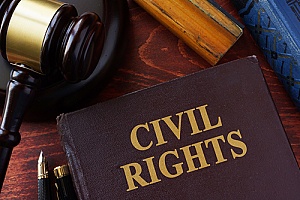 Unfortunately, disputes happen in life and can vary greatly. Disagreements can occur between individuals and businesses alike. Disputes occurring between two people. different businesses, neighbors, contractors/subcontractors or any combination may require legal intervention. As opposed to criminal litigation, civil lawsuits are usually designed to obtain compensation for civil damages, injuries, contract disputes, disagreements over leases, disputes over construction projects or as compensation for discrimination.
Unfortunately, disputes happen in life and can vary greatly. Disagreements can occur between individuals and businesses alike. Disputes occurring between two people. different businesses, neighbors, contractors/subcontractors or any combination may require legal intervention. As opposed to criminal litigation, civil lawsuits are usually designed to obtain compensation for civil damages, injuries, contract disputes, disagreements over leases, disputes over construction projects or as compensation for discrimination.
Experience You Can Trust
Our law firm actively handles civil litigation matters in both state and federal court venues. Our services include all areas of legal practice such as discovery, depositions, court filings, motions, and trial preparation. We have extensive experience in all forms of litigation, from simple mediation to filing an appeal. We have handled many types of litigation, including civil rights cases, collective action claims, and business matters such as breach of contract. Regardless of case type, our attorneys are able to assist you with your civil litigation legal matters.
Strategic Approach and Execution
 Every civil litigation case is different, but regardless of how complex your situation may be, The Brown Firm PLLC has proven ability to exceed client expectations and help them achieve their goals by utilizing a systematic approach built upon extensive courtroom litigation experience and a thorough understanding of any relevant laws. The Brown Firm’s ability to succeed in litigation is captured in the successes of its attorneys.
Every civil litigation case is different, but regardless of how complex your situation may be, The Brown Firm PLLC has proven ability to exceed client expectations and help them achieve their goals by utilizing a systematic approach built upon extensive courtroom litigation experience and a thorough understanding of any relevant laws. The Brown Firm’s ability to succeed in litigation is captured in the successes of its attorneys.
Case Resolutions
There are many instances where a case can be settled prior to going to trial. If we believe that our client is best served by entering into mediation or negotiations prior to going to trial, we will make this recommendation to the client for a final decision. We believe that it is our obligation to provide our clients with the best possible solution to your legal issues, even if this means not going to trial. To learn more about the legal achievements of our team, visit: Firm History.
Filing An Appeal
There are several issues that can arise during a court trial that may result in one party filing an appeal when the case closes. Our attorneys are experienced in filing appeals in both the state and federal level. We have complete capabilities of proceeding through the appellate process in a manner that is most effective for our clients.
Our attorneys have significant experience and knowledge in creating appellate briefs. Their mastery of legal writing will help present your case in the best possible manner before the panel of appellate judges. We believe that the ability to construct superior legal briefings for the Appellate Court is one of the characteristics that distinguish our firm from other legal firms. To learn more about the legal achievements of our team, visit: Firm History.
Services We Provide
 Civil litigation can encompass a variety of different lawsuit types across many industries. Although necessary, civil litigation cases can become stressful and expensive if not managed correctly. If you believe you have a lawsuit where you are entitled to financial compensation, it does not benefit you to spend money on overpriced and ineffective legal representation. The Brown Firm PLLC provides comprehensive civil litigation services in the areas of:
Civil litigation can encompass a variety of different lawsuit types across many industries. Although necessary, civil litigation cases can become stressful and expensive if not managed correctly. If you believe you have a lawsuit where you are entitled to financial compensation, it does not benefit you to spend money on overpriced and ineffective legal representation. The Brown Firm PLLC provides comprehensive civil litigation services in the areas of:
General Civil Litigation
- Disputes Involving Contracts or Agreements
- Disputes Between Individuals
- Disputes Between Businesses
- Disputes Involving Contractors/Subcontractors
- Alternative Dispute Resolution
Employment Law
- Employment Litigation and Appeals
- Wage and Hour Disputes
- Payment And Collection Disputes
- Discrimination, Harassment and Civil Rights
- Breach Of Contract
- Wrongful Termination
- Whistleblower Litigation and Retaliation
- Sarbanes Oxely Act (SOX)
- Americans with Disabilities Act (“ADA”) and ADA Amendment Act (“ADA-AA”)
- Federal Employee Whistleblowers
- Hostile Work Environment
- 42 USC Section 1981
- 42 USC Section 1983
- 42 USC 1985 (conspiracy)
- False Claims Act
- Restrictive Covenant
Real Estate Law
- Attorney representation for foreclosure defense
Contract Services
- Review of Contracts, Leases and Agreements
- Contract Drafting
- Contract Negotiation
Personal Injury Law
- General Personal Injury Claims
- Car Accidents
- Motorcycle Accidents
- Truck Accidents
- Medical Malpractice
- Dental Malpractice
- Doctor Errors
- Malpractice in Hospitals
- Surgical Errors
- Early Discharge
- Slip and Fall Accidents
- Wrongful Death
- Premises Liability (accidents on a property)
- Assault
- Boating Accidents
- Pharmaceutical Products
Contact Us To Discuss Your Case
If you are currently involved in a civil dispute, or are unsure if you have grounds for a civil case and would like more information, call The Brown Firm PLLC at 703.828.0900 or schedule a consultation online. Our experienced team can help you understand what your options are. Don’t take a chance on unreliable and overpriced legal services. Entrust your civil case to our firm. We are confident in our abilities to represent your interests both inside and outside of the courtroom.

